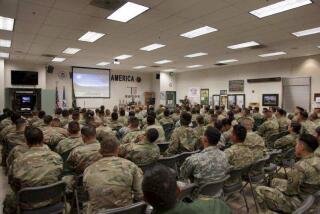Marines to Join Front Lines in Fight on Drugs
WASHINGTON —
In a new move to expand the military’s role in fighting drug traffic, the Marines on Friday agreed to join the Immigration and Naturalization Service in conducting training and surveillance operations along the southwest border of the United States.
The announcement of the agreement, which would put Marines on the front lines of the drug war for the first time, comes as Defense Secretary Dick Cheney ponders a U.S. Army proposal to establish a special military task force at Ft. Bliss, Tex.
The proposed new military organization, to be called “Joint Task Force 6,” would help inspect cargo, conduct reconnaissance operations and ferry drug enforcement agents on raids along the border between the United States and Mexico, Pentagon officials said.
Although not yet approved by Cheney, the Army proposal is the work of Gen. Colin L. Powell, the chairman of the Joint Chiefs of Staff, who has pushed for a rethinking of the military’s role in the fight against drugs. Powell devised the plan while he was commander of the U.S. Forces Command, which is responsible for arming and training U.S.-based Army forces for the defense of the continental United States.
In unveiling the Army’s blueprint for the coming decade Thursday, Army Chief of Staff Carl E. Vuono emphasized the importance of the new drug-fighting mission, saying that it “is not just going to be a 1990 issue.”
National Guard and Reserve forces have been used to watch border areas in the past but the INS-Marine Corps agreement marks the first assignment of full-time military personnel to such activity.
The joint efforts will be conducted primarily along the southern borders of Arizona and California, a Justice Department official said.
The two agencies acknowledged the risk of an armed clash between the training units and drug traffickers.
“Some areas designated for joint training are heavily trafficked by drug smugglers,” the memorandum said. “Planners will endeavor to select training areas and observation points which minimize the opportunity of a chance armed engagement.”
Officials said that no more than 50 Marine officers will serve on temporary assignment with the INS at any one time and that Marines will be barred from pursuing and arresting drug smugglers. The military’s role is tightly circumscribed by the Civil War-era Posse Comitatus Act, which bars the use of military forces for domestic law enforcement.
Defense officials said that under both initiatives the military’s experience with night-vision equipment would bring a major new capability to the drug interdiction effort in the Southwest.
According to a memorandum of understanding establishing the partnership between the INS and the Marines, the troops’ primary focus will be the “training and advising of civilian law enforcement officials” in the detection and monitoring of drug trade routes in the air and on the ground.
“During night joint training operations, emphasis will be on ground reconnaissance, selection and manning of observation posts and the employment of night observation devices,” the memorandum said.
More to Read
Sign up for Essential California
The most important California stories and recommendations in your inbox every morning.
You may occasionally receive promotional content from the Los Angeles Times.











